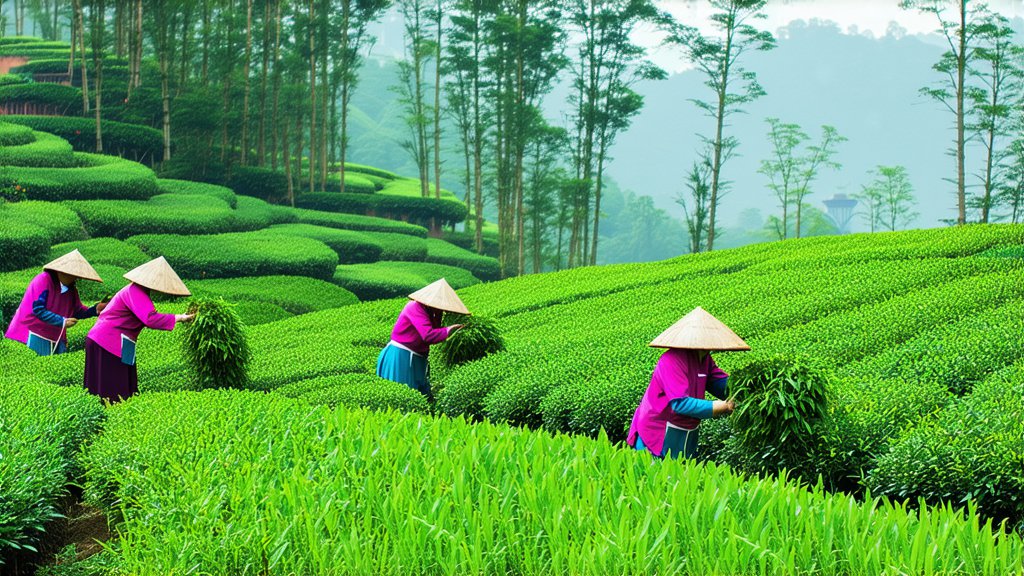
Longjing Tea, also known as Dragon Well Tea, is one of the most revered and celebrated varieties of Chinese green tea. Originating from the verdant hills of Hangzhou in Zhejiang Province, Longjing Tea has been cherished by tea connoisseurs for centuries. This article delves into the rich history, diverse types, meticulous crafting process, and the art of appreciating Longjing Tea.
History of Longjing Tea
The history of Longjing Tea dates back to the Tang Dynasty (618-907 AD), but it was during the Song Dynasty (960-1279 AD) that it began to gain prominence. Legend has it that the tea was so beloved by Emperor Qianlong of the Qing Dynasty that he personally visited the tea gardens and declared the area a "Imperial Tea Garden." This imperial endorsement elevated Longjing Tea to a status symbol, and its reputation spread far and wide.
Varieties of Longjing Tea
Longjing Tea is categorized into several grades, each with its unique characteristics. The most prestigious is the "Pre-Qingming" or "Ming Qian" Longjing, harvested before the Qingming Festival, which is known for its exceptional quality and high price. Other grades include "Rain Tea" or "Guang Ming" harvested after the Qingming Festival, and "Summer Tea" or "Xia Cha" and "Autumn Tea" or "Qiu Cha," which are harvested in the respective seasons. Each grade offers a distinct flavor profile, with the early spring teas being the most delicate and prized.
Crafting Process of Longjing Tea
The crafting of Longjing Tea is a labor-intensive process that requires skill and precision. The process can be broken down into several key steps:
-
Picking: Only the tenderest leaves and buds are handpicked, typically the top two leaves and a bud, known as "one heart and two leaves." This ensures the tea retains its delicate flavor and aroma.
-
Withering: The freshly picked leaves are spread out to wither, allowing them to lose some moisture and begin the oxidation process.
-
Kneading: The leaves are then gently kneaded to break down the cell walls, releasing the natural juices and initiating the enzymatic reactions that shape the tea's flavor.
-
Pan-firing: This is the signature step in Longjing Tea production. The leaves are placed in a hot wok and stirred continuously by hand. This high-temperature process deactivates the enzymes, halting oxidation and preserving the green color and fresh flavor of the tea.
-
Drying: The pan-fired leaves are then dried to reduce the moisture content to a safe level for storage, ensuring the tea's longevity and quality.
Appreciating Longjing Tea
To fully appreciate the nuances of Longjing Tea, one must engage in the traditional Chinese tea ceremony, which is as much an art form as it is a method of preparation. Here are the steps to savor Longjing Tea:
-
Warming the Pot: The teapot is preheated with hot water to maintain the temperature for brewing.
-
Scenting the Leaves: A small amount of tea is placed in the pot, and hot water is poured over it, then immediately drained. This allows the aroma of the tea to be appreciated before brewing.
-
Brewing: The pot is filled with hot water, and the tea is allowed to steep for a short period, typically 1-3 minutes, depending on the grade and personal preference.
-
Pouring: The brewed tea is poured into small cups, ensuring each cup receives an equal amount of tea.
-
Tasting: The tea is sipped slowly, allowing the flavors to unfold on the palate. Longjing Tea is known for its sweet, fresh, and slightly vegetal taste, with a lingering aftertaste that is both refreshing and satisfying.
Health Benefits of Longjing Tea
Longjing Tea is not only a delight to the senses but also offers numerous health benefits. Rich in antioxidants, it helps to combat free radicals and supports heart health. It is also known to aid in digestion, boost the immune system, and provide a gentle energy boost without the jitters associated with coffee.
Conclusion
Longjing Tea is a testament to the centuries-old tradition of Chinese tea culture. Its history, the meticulous crafting process, and the ritual of tasting encapsulate the essence of Chinese tea. Whether you are a seasoned tea enthusiast or a newcomer to the